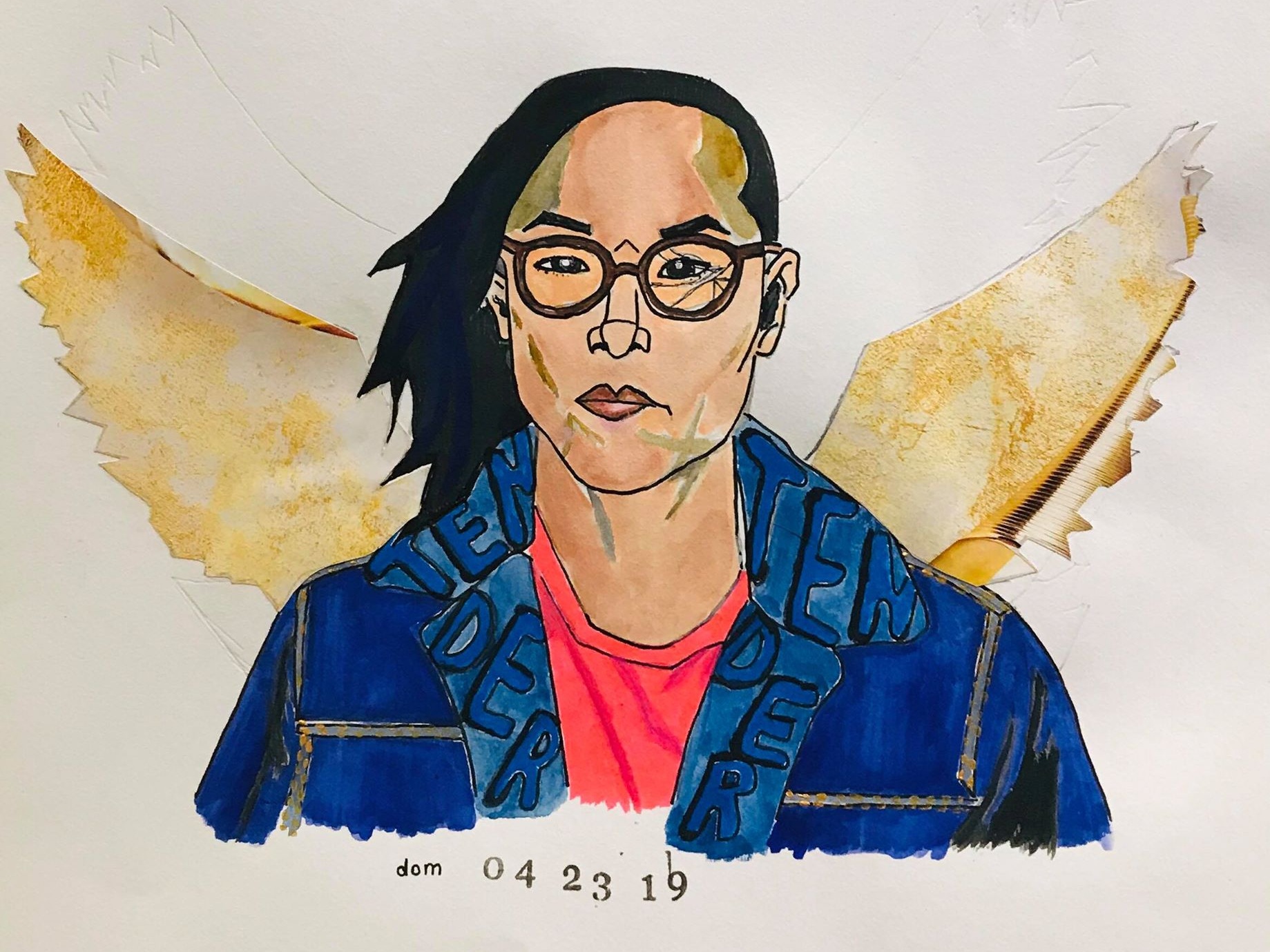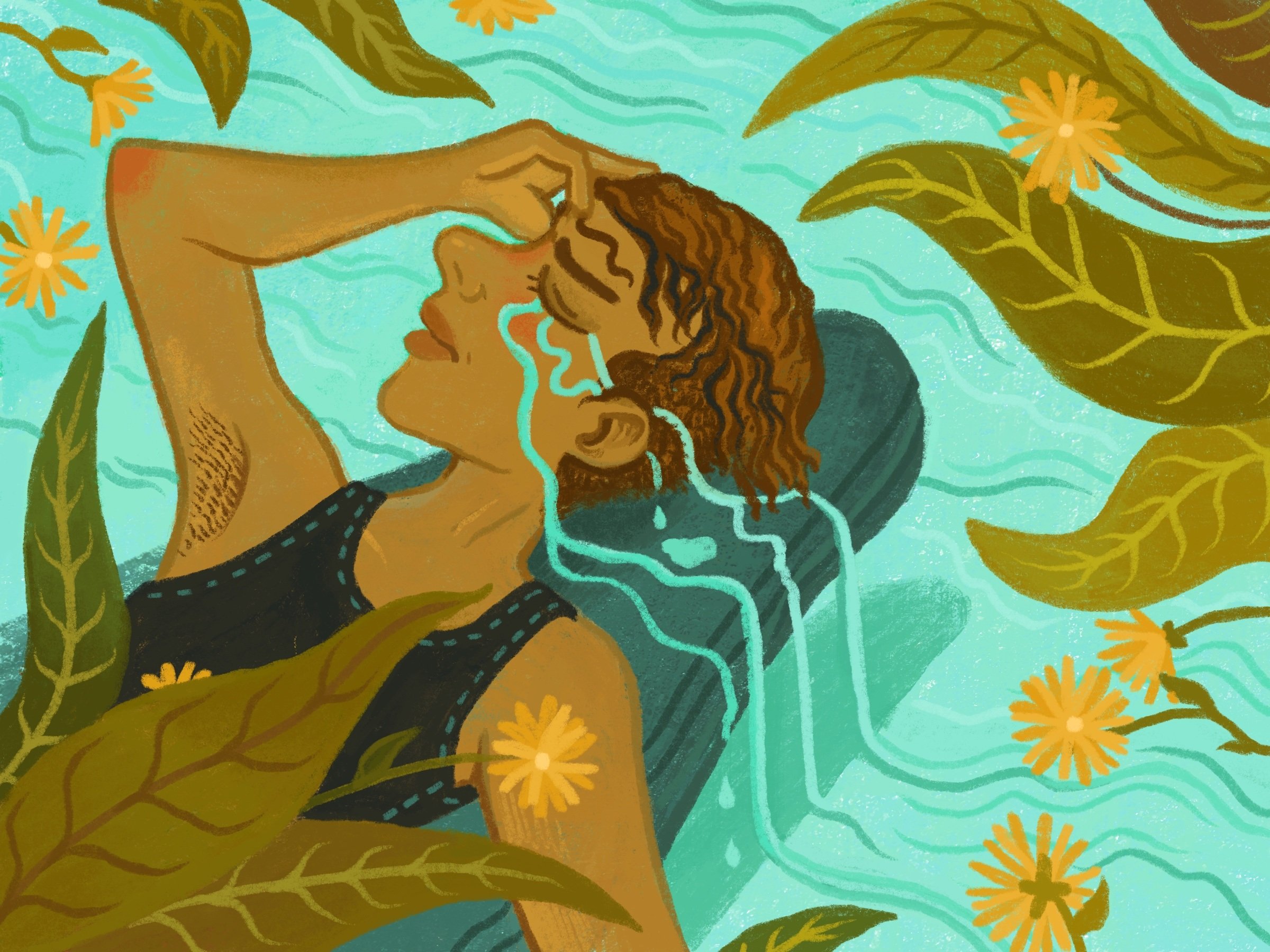Art by Dominic Bradley
CN: queer intimate partner violence, rape, kink
In my youth, I didn’t know I was lesbian because I wasn’t sexually attracted to feminine women. I knew that girls who liked girls existed, sure, but the introduction of a masculine gender expression on a female assigned body dramatically opened my mind to the many ways a person can be able to love.
I met my first girlfriend well after I started college. After things ended, dating masculine women felt too close to my broken heart. I bought an entire new wardrobe to become what I thought the best version of a ‘stud’ was and started dating femmes. In my head it was easier to do a complete 360 and perpetuate the heteronormative lesbian couples that had been modeled for me in mainstream media. But even deeper than that was a misunderstanding that my gender expression defined the sort of people I’d be sexually attracted to. Let’s just say that the clothes fit me much better than the femmes did.
Safety became a fantasy I wasn’t permitted to act out.
Unlearning the internalized homophobia that society instilled in me inspired me to be open about my desires, despite being constantly shamed by other members of my own community who rejected this less common relationship structure. Seeing two masc folks together meant seeing two men, for the same reasons I thought that I could put on a bow tie and be happy with a femme. My understanding of the differences between assigned sex at birth, gender identity, gender expression, orientation and behavior was just as limited until I started teaching. I never fault folks for coming into their learning later in life. I know exactly how it feels to have to pull those layers back the hard way.
Being a masc-presenting AFAB (assigned female at birth) individual who was also attracted to other masculine people posed a number of heternormative challenges in my last relationship. My partner preferred gendered roles, being the one to hold the door open, pay for everything, in charge, in control. On our second date, she was upset that I paid for the last for the last of four rounds of drinks. On our second date, she also told me she was a Republican. A queer, black, lesbian republican. Talk about an anomaly. Talk about performative chivalry. Talk about pervasive white supremacy.
At first, I was a combination of shocked, floored and flattered that this newfound chocolate cutie wouldn’t let me lift a finger. When it bled into our sexual relationship, the first time she introduced me to her understanding of BDSM, I told myself it made sense. That if I was willing to be submissive during sex that I would need to acquiesce in other parts of our relationship, which presented flags more crimson than I was able to see through rose-colored glasses. Even after I was raped, I spent months questioning myself for being with someone who told me exactly who they were when I met them. Who showed me the darkest parts of themselves and handed me their own heavy traumas to hold.
Secondary trauma ends up being quite the distraction once you’ve been made aware of your own. I spent 7 days processing before we finally broke up; I needed time to accept what happened and make sense of the loss of control I had not consented to, despite our history of my submission when things had felt safe. Our safe words were worthless. Safety became a fantasy I wasn’t permitted to act out.
BSDM is only BDSM when everyone involved is in agreement
As a sex educator who considers themselves trauma-informed, I spent weeks afterwards knowing the textbook next steps for healing, believing I had to get therapy in order to “properly” address what had happened. Thinking that the only route to recovery from sexual assault had a single, linear direction. For my own personal reasons, I didn’t trust many therapists. Past experiences of broken confidence held me back, and I had even less confidence that I would be able to find a queer competent, POC identified behavioral health professional with sexual assault experience who was worth investing time, money, and trust in. It felt like searching for an intersectional needle in an impossibly systemic haystack.
The next month, the universe forced me to sit down. A serious infection in my wisdom teeth kept me homebound for two weeks and I couldn’t eat solid food for three. I was in extreme emotional and physical pain. I was suicidal. Death seemed better than this. But my support system grounded me so well in my body and mind that the guilt I felt at the thought of leaving my loved ones kept me alive. Surrounded by love and unable to move, I was able to see the universe from angles I’d never considered while being so busy with everyday life. I had some serious revelations about humanity. I was granted clarity to forgive. I felt strong enough to move on once I’d gone back to work that therapy ended right back at the bottom of my list. I was fine.
Over the next year—too distrusting to commit to any other romantic relationships—I fell in love with my work. While traveling for my sex ed certification therapy sought me out in one of the most unexpected ways. My professional studies introduced me to resources that helped me broaden my understanding of context during sexual assault and forgive myself for feeling so unsettled about what had happened to me. To participate in consensual fantasies of rape does not justify a partner’s desire to act them out whenever it suits them. BSDM is only BDSM when everyone involved is in agreement and safe words exist to be respected.
I’ve stopped shaming myself for not wanting to have sex in the middle of a fight. Since my emotions had been affected more than my physical body felt; I gave space and grace to my emotions for feeling violated while I was not in a comfortable space to experience them. I encourage all survivors—especially those interacting with the nuance of kink—to gift themselves with the same grace I did.
You deserve bodily autonomy and the right to change your mind. You deserve peace in any form it may arrive. You deserve patience. You deserve your own path, and if It doesn’t look like everyone else’s I encourage you to share your own truth. It can be freeing as fuck.
You can also sustain our team of disabled queer & trans creatives of color by pledging on Patreon or making a one-time donation.
Image description:
An illustration on off-white paper. A dark-skinned Black person is wearing a backwards snapback, a t-shirt that says "SPACE" and a purple hoodie under a blue jacket. They have a septum piercing. One hand is held up to their lips, with the word "grace" scrawled above it.
About Dominic Bradley:
Dominic Bradley is a multimedia artist based in Brooklyn. They are also an editor of Rest for Resistance and facilitator with QTPoC Mental Health.
About Nefertari Sloan:
Sloan is a non-binary person of color who has been facilitating comprehensive conversations with people about sexuality since 2016. Their primary inspirations are rooted in a passion for the continued empowerment of marginalized communities--in 2018 they were featured in Cosmo for their LGBTQ inclusive sex ed curriculum, and locally recognized for their activism speaking truth to power within racist non-profit organizations. Their hobbies include offering hugs, giving compliments, and dancing in grocery aisles.











